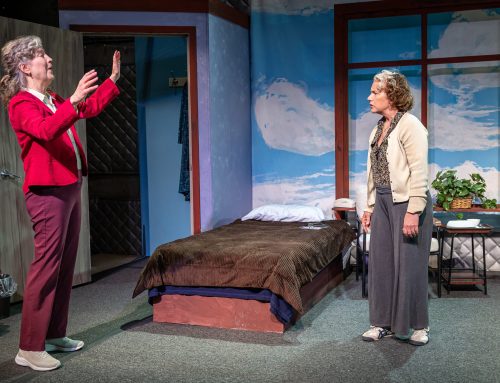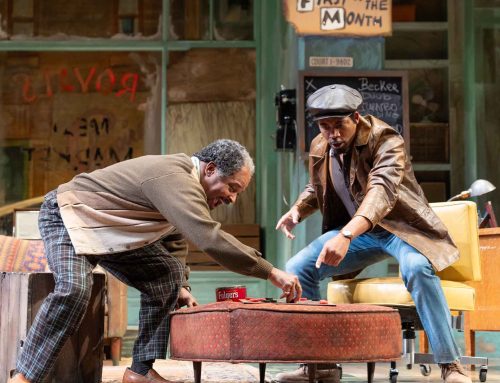at the Oregon Shakespeare Festival

written by William Shakespeare
directed by Bill Rauch
Dan Donohue’s Hamlet is so strong, so conversational, so underplayed, so accessible that every moment of the play belongs to him. In some productions, Hamlet shows up on stage as a wandering soul with a mouth full of pretty words. Not here. This Hamlet is at the knowing center of all action and activity. The plot, the motives, the night, the story, the tragedy are all clear and all his.
This Hamlet is not a callow 20-something who wound up at school, but a deferred student with some life behind him. More of a reflective man than an icon of dithering youth.
At the conclusion of the short-feeling 3 1/4-hour play, when Hamlet resurrects himself for the deservedly wild standing ovation, you almost feel sorry for the other cast members who were bit players on the fringe of Donohue’s spotlight.
And then, the amazement sets in.
I’ve never seen Hamlet’s uncle, Claudius (Jeffrey King), played with so much nuance. He’s no one-dimensional evil schemer. As King said in an discussion, Claudius starts off the play at the top of the world. He’s truly happy having fulfilled his twisted desires for his brother’s crown and wife. He’s a CEO at the top of his game. Hamlet‘s real victim, according to King, is Claudius whose world falls apart during the evening.
I’ve never seen a Polonius (Richard Elmore) less cartoonish or more real-world dad-like. Elmore unleashed the torrent of florid words in the script without creating meaningless prattle, the prattle which usually drowns believability and creates an “Old Fool” avatar to amuse the audience in comic relief. Instead, Elmore’s performance was truly rich, not gaudy.
I’ve never seen an Ophelia (Susannah Flood) who existed in her own right. A daughter who is playful and bright in the early scenes. Someone a prince might genuinely find interesting. Too often Ophelia appears on stage wandering through blank verse until her closeup moments with the kitchen spices. Not here. Flood’s character doesn’t start off wispy and vague. This normal Ophelia is affected by the actions seen by the audience.
I’ve never seen a Horatio (Armando Durán) have a plausible reason for possessing any wisdom which Hamlet would listen to. Director Rauch has given his Horatio gray hair and an identity as older man, an aging student who couldn’t leave the campus. You’ve seen Durán’s Horatio in the cafes around Harvard, Berkeley, and Wittenberg. This Horatio has perspective and experience to use in advising his friend from the university.
I’ve never seen the ghost of Hamlet’s father (Howie Seago) have clear personality or intent. Seago isn’t just an apparition with a communications problem. A deaf actor, Seago uses sign language to talk, and it’s a direct and powerful device. Hamlet interprets for the audience, leaving a legitimate distance between the ghost and the living spectators.
And, I could go on and on. Rosencrantz (Vilma Silva) and Guildenstern (Jeany Park), the gravedigger (Bill Geisslinger), and Bernardo (Josiah Phillips) each give perfect character snippets. Too often these parts are played rushed and almost as interchangeable Elizabethan actor scenery. Not here!
So, this Hamlet isn’t completely Dan Donohue’s show. Donohue’s Hamlet was unique, completely spectacular. Yet, with this breadth of excellence, top accolades must go to director Bill Rauch. Rauch, who took the story and wove it so well and tailored it so smartly around Hamlet that each outstanding performance felt like an inevitable backdrop to the star character.
Rauch set the story in modern times, a conceit that puts me off and makes me suspicious. If you’re going to save money on Elizabethan costumers, it better serve a dramatic purpose! In this production, damn it, it does! The modern drag truly decreases the distance between The Classic Play and the audience.
Hamlet here is not the dusty story filled with newly born clinches. It’s not a far-removed tale of olde-time palace intrigue. The smart, telling but unobtrusive dress (by costume designer Deborah M. Dryden), keeps us informed and in the present. The clean, gray set (by scenic designer Christopher Acebo) is throne room/boardroom. The set seems to magically grow as called for by the script and then goes away so we can watch without distraction.
The modern setting isn’t just surface deep, clothes deep, or furniture deep. The pace, lighting, and the music are from last night’s cable HDTV special. Best example: the play within a play puts Shakespeare’s lines to a hip hop beat. Definitely not Elizabethan, completely not my style, 100% best choice.
Rauch’s view of Hamlet is the new standard for me. Of course the show is all about Hamlet. Of course Hamlet is an older student. Of course Hamlet speaks slowly, deliberately, and not madly. Of course it play best placed in current time. Of course lighting is used as visual parenthesis for the soliloquies. Of course Claudius took over the kingdom without Gertrude’s knowledge. Of course the ghost is sensible. Of course Polonius’ kids actually listen to his sage, if overly parental, advice. Every choice: of course. Of course. Of course.
Even with such a tight and complete take on the play, Rauch is consistently and lavishly praised by actors in their talks as being amazingly collaborative. “Collaborative” yet nothing is out of place or forgotten? No tic or twitch goes without an eventual payoff. Every rivet has its place and meaning.
“Collaborative” or supernatural conjuring? I have already bought tickets to see Hamlet another time to see if I can tell.
Ozdachs Rating: A Raving ![]()





Hamlet Review
I’m with you – haven’t written my own review yet, but I loved this production for many of the same reasons. Ophelia was *so* great as a character in her own right, she was marvelous. I think that entire family (the Poloniuses?) was more cohesively a family than I’ve ever seen. Great show.
A dissenting voice – I just saw this Hamlet. Rauch has managed to turn the magnum opus of the greatest playwright of the English-speaking stage into a clown show. If that was his intention, well-done! In the process, he ran rough-shod over the poetry and as far as I can tell ignored every intention. I was alone in the audience – I admit – surrounded by adoring fans who howled with laughter at every campy unmotivated twitch and facial expression that scampered its way across Hamlet’s body. Payoffs? Sure – “asses in seats.” The murder of Polonius was played for laughs and got them a plenty. The repentance scene, perhaps the most important in the play, was reduced to a toilet joke. Hamlet’s reaction to his his father’s murder is so shallow, it’s hard to take it seriously. Indeed, for all the laughter in the audience, it seemed no one did. Nothing out of place or forgotten – really? Hamlet is not a comedy, yet there are laughs, intended by the playwright to be sure, but Shakespeare’s laughs are placed where they are for a reason – to heighten the tragedy, not to undermine it. Revulsion is too puny a word to express my reaction to this production.